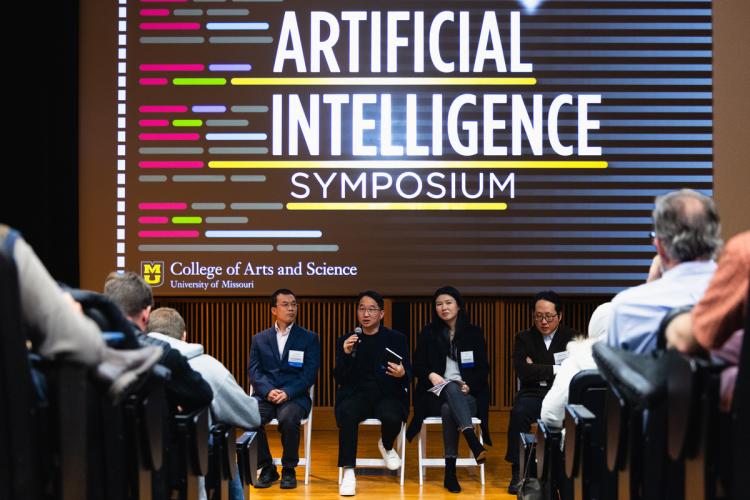
Experts from the College of Arts and Science and College of Agriculture, Food and Natural Resources answer questions during the Artificial Intelligence Symposium.
Ahead of a new semester, MU’s top researchers converged at the College of Arts and Science AI Symposium. Faculty representing eight of the university’s schools and colleges shared how artificial intelligence and machine learning are powering their work — and what new opportunities are ahead for Mizzou.
“Thanks to the power of AI,” said Cooper Drury, dean of the College of Arts and Science, as he welcomed speakers, attendees and guests, “we can pursue life’s most challenging questions with no boundaries.”
Among more than a dozen faculty presenters, the applications of AI and machine learning tools at Mizzou were shown across disciplines. During the first session, attendees learned how AI is applied in fashion, political science, architecture and agriculture. The subsequent sessions shared a similar range of academic diversity.
In addition to learning from the day’s speakers, attendees were introduced to the AI Research Interest Group. Hosted by the division of Research Innovation and Impact, the new resource will build a community of interest and provide support for collaborations and grant writing.
“AI is transforming many, if not most, aspects of our society,” said Provost Matt Martens, who was among the guests who took the podium, “and higher education is no exception.”
Martens was joined by Thomas Spencer, Vice Chancellor for Research and Economic Development, who introduced Tim Glass, associate dean of research for the College of Arts and Science, and organizer of the symposium, alongside Clint Stober, A&S faculty fellow for AI in research.
Faculty interested in artificial intelligence are encouraged to join the new AI Research Interest Group. To learn more, contact Clintin Davis-Stober.
| Symposium sessions |
|---|
AI in the World AI meets fashion: A new era of intelligence and innovation Information overload and tracking bias in standards-based measurement AI and machine learning research for architecture design and education AI and digital technology enable sustainable agriculture production |
Advances in AI Artificial intelligence-driven solutions for next-generation cybersecurity Multi-agent control and learning AI innovations beyond GenAI: Cohort discoveries and quantum advantages |
AI in Health and Education AI-driven biomarker insights to transform Alzheimer’s disease prevention trials Use and perceptions of using AI tools for teaching and learning at the Sinclair School of Nursing Using AI to co-design and assist neurodiverse learners in a cybersecurity VR system AI literacy education |
AI and Law Using AI as a research assistant Government-backed insurance for unpredictable technologies Unraveling stock market prediction: Assessing the impact of image conversion, algorithm structure, and label variable on CNN forecasting |